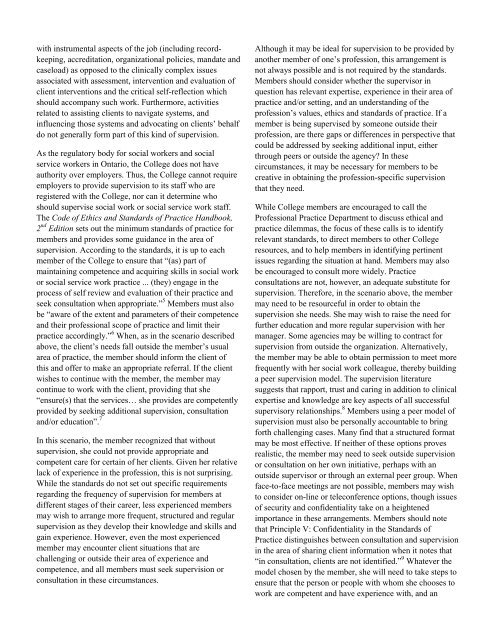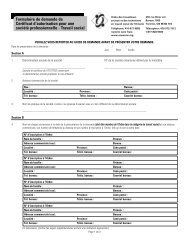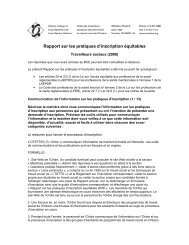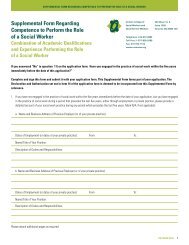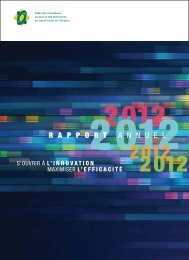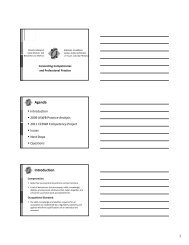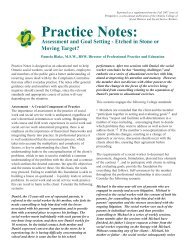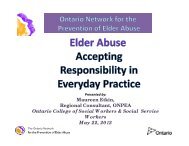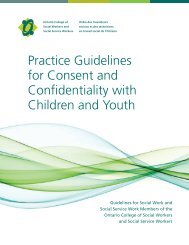Supervision - Ontario College of Social Workers and Social Service ...
Supervision - Ontario College of Social Workers and Social Service ...
Supervision - Ontario College of Social Workers and Social Service ...
Create successful ePaper yourself
Turn your PDF publications into a flip-book with our unique Google optimized e-Paper software.
with instrumental aspects <strong>of</strong> the job (including recordkeeping,<br />
accreditation, organizational policies, m<strong>and</strong>ate <strong>and</strong><br />
caseload) as opposed to the clinically complex issues<br />
associated with assessment, intervention <strong>and</strong> evaluation <strong>of</strong><br />
client interventions <strong>and</strong> the critical self-reflection which<br />
should accompany such work. Furthermore, activities<br />
related to assisting clients to navigate systems, <strong>and</strong><br />
influencing those systems <strong>and</strong> advocating on clients’ behalf<br />
do not generally form part <strong>of</strong> this kind <strong>of</strong> supervision.<br />
As the regulatory body for social workers <strong>and</strong> social<br />
service workers in <strong>Ontario</strong>, the <strong>College</strong> does not have<br />
authority over employers. Thus, the <strong>College</strong> cannot require<br />
employers to provide supervision to its staff who are<br />
registered with the <strong>College</strong>, nor can it determine who<br />
should supervise social work or social service work staff.<br />
The Code <strong>of</strong> Ethics <strong>and</strong> St<strong>and</strong>ards <strong>of</strong> Practice H<strong>and</strong>book,<br />
2 nd Edition sets out the minimum st<strong>and</strong>ards <strong>of</strong> practice for<br />
members <strong>and</strong> provides some guidance in the area <strong>of</strong><br />
supervision. According to the st<strong>and</strong>ards, it is up to each<br />
member <strong>of</strong> the <strong>College</strong> to ensure that “(as) part <strong>of</strong><br />
maintaining competence <strong>and</strong> acquiring skills in social work<br />
or social service work practice ... (they) engage in the<br />
process <strong>of</strong> self review <strong>and</strong> evaluation <strong>of</strong> their practice <strong>and</strong><br />
seek consultation when appropriate.” 5 Members must also<br />
be “aware <strong>of</strong> the extent <strong>and</strong> parameters <strong>of</strong> their competence<br />
<strong>and</strong> their pr<strong>of</strong>essional scope <strong>of</strong> practice <strong>and</strong> limit their<br />
practice accordingly.” 6 When, as in the scenario described<br />
above, the client’s needs fall outside the member’s usual<br />
area <strong>of</strong> practice, the member should inform the client <strong>of</strong><br />
this <strong>and</strong> <strong>of</strong>fer to make an appropriate referral. If the client<br />
wishes to continue with the member, the member may<br />
continue to work with the client, providing that she<br />
“ensure(s) that the services… she provides are competently<br />
provided by seeking additional supervision, consultation<br />
<strong>and</strong>/or education”. 7<br />
In this scenario, the member recognized that without<br />
supervision, she could not provide appropriate <strong>and</strong><br />
competent care for certain <strong>of</strong> her clients. Given her relative<br />
lack <strong>of</strong> experience in the pr<strong>of</strong>ession, this is not surprising.<br />
While the st<strong>and</strong>ards do not set out specific requirements<br />
regarding the frequency <strong>of</strong> supervision for members at<br />
different stages <strong>of</strong> their career, less experienced members<br />
may wish to arrange more frequent, structured <strong>and</strong> regular<br />
supervision as they develop their knowledge <strong>and</strong> skills <strong>and</strong><br />
gain experience. However, even the most experienced<br />
member may encounter client situations that are<br />
challenging or outside their area <strong>of</strong> experience <strong>and</strong><br />
competence, <strong>and</strong> all members must seek supervision or<br />
consultation in these circumstances.<br />
Although it may be ideal for supervision to be provided by<br />
another member <strong>of</strong> one’s pr<strong>of</strong>ession, this arrangement is<br />
not always possible <strong>and</strong> is not required by the st<strong>and</strong>ards.<br />
Members should consider whether the supervisor in<br />
question has relevant expertise, experience in their area <strong>of</strong><br />
practice <strong>and</strong>/or setting, <strong>and</strong> an underst<strong>and</strong>ing <strong>of</strong> the<br />
pr<strong>of</strong>ession’s values, ethics <strong>and</strong> st<strong>and</strong>ards <strong>of</strong> practice. If a<br />
member is being supervised by someone outside their<br />
pr<strong>of</strong>ession, are there gaps or differences in perspective that<br />
could be addressed by seeking additional input, either<br />
through peers or outside the agency In these<br />
circumstances, it may be necessary for members to be<br />
creative in obtaining the pr<strong>of</strong>ession-specific supervision<br />
that they need.<br />
While <strong>College</strong> members are encouraged to call the<br />
Pr<strong>of</strong>essional Practice Department to discuss ethical <strong>and</strong><br />
practice dilemmas, the focus <strong>of</strong> these calls is to identify<br />
relevant st<strong>and</strong>ards, to direct members to other <strong>College</strong><br />
resources, <strong>and</strong> to help members in identifying pertinent<br />
issues regarding the situation at h<strong>and</strong>. Members may also<br />
be encouraged to consult more widely. Practice<br />
consultations are not, however, an adequate substitute for<br />
supervision. Therefore, in the scenario above, the member<br />
may need to be resourceful in order to obtain the<br />
supervision she needs. She may wish to raise the need for<br />
further education <strong>and</strong> more regular supervision with her<br />
manager. Some agencies may be willing to contract for<br />
supervision from outside the organization. Alternatively,<br />
the member may be able to obtain permission to meet more<br />
frequently with her social work colleague, thereby building<br />
a peer supervision model. The supervision literature<br />
suggests that rapport, trust <strong>and</strong> caring in addition to clinical<br />
expertise <strong>and</strong> knowledge are key aspects <strong>of</strong> all successful<br />
supervisory relationships. 8 Members using a peer model <strong>of</strong><br />
supervision must also be personally accountable to bring<br />
forth challenging cases. Many find that a structured format<br />
may be most effective. If neither <strong>of</strong> these options proves<br />
realistic, the member may need to seek outside supervision<br />
or consultation on her own initiative, perhaps with an<br />
outside supervisor or through an external peer group. When<br />
face-to-face meetings are not possible, members may wish<br />
to consider on-line or teleconference options, though issues<br />
<strong>of</strong> security <strong>and</strong> confidentiality take on a heightened<br />
importance in these arrangements. Members should note<br />
that Principle V: Confidentiality in the St<strong>and</strong>ards <strong>of</strong><br />
Practice distinguishes between consultation <strong>and</strong> supervision<br />
in the area <strong>of</strong> sharing client information when it notes that<br />
“in consultation, clients are not identified.” 9 Whatever the<br />
model chosen by the member, she will need to take steps to<br />
ensure that the person or people with whom she chooses to<br />
work are competent <strong>and</strong> have experience with, <strong>and</strong> an


